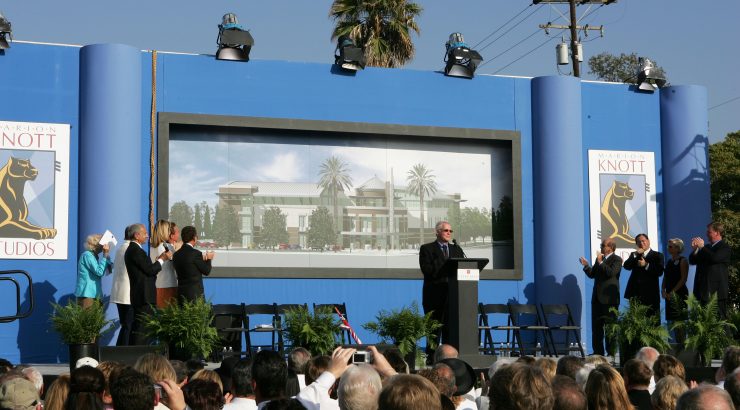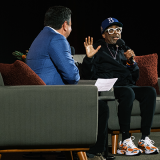Producing a Film School – Part 2
March 6, 2017
Last week, we looked at the initial steps of what it takes to create a film school.
Now, we continue with part two of how Dodge College came to be.
Big ideas
Over the years, big ideas drove the vision for what became Dodge College. Some of those ideas came from Bassett’s experience as a teacher, including his many years teaching at private/boarding schools as well as at public high schools and universities before coming to Chapman. Others were inspired by what was happening in the business; still others came from working with colleagues at Chapman and at other film schools around the country as well as with friends in the community. And the value and power of those ideas was driven by constant reexamination and reinforcement through regular faculty retreats and a constant focus on planning based on what was best for the students, rather than faculty schedules or preference.
Key elements of the overall vision took many years to develop and new pieces were added as new opportunities arose. Among the strategic ideas that helped drive Chapman’s film school to national and international recognition with highly selective student admissions and the top students in the classroom, were the following:
Core values: Planning/curriculum
- Film is the literature of this century: An understanding that film is the most powerful medium of our time—one that crosses borders, communicates with people at every socio-economic and educational level and brings together all of the other art forms—paints the bigger picture of film education. The art of visual storytelling has become vital to every business, particularly with the continuing evolution of the Internet and mobile devices. The ability to use the tools of filmmaking is preparation for a wide variety of careers, Bassett says, not just a graduate’s first job, but his or her job 10 or 20 years from now.
- Student-centric: Schedules and activities focus on what works best for students. Although many faculty live in LA and face a sometimes challenging commute, they are committed to the idea students come first. Mentoring is the hallmark of student/faculty interaction.
- Camera in your hands day one: From the beginning, students began making films as freshmen, at a time when many other programs restricted filmmaking to the junior year. Although that kind of restriction is less prevalent today as other schools have adopted Chapman’s philosophy, it still exists in some places.
- Students own their own films: From the beginning, Chapman students have retained the rights to their own films. Even today, some film schools hold copyright to student work.
- Open 24/7: Reflecting both how students live and work and the business itself, Marion Knott Studios is available to students 24/7 through key card access.
- The business of the business: The importance of teaching students how the film business works is the strategic vision behind many special programs that have come to define Dodge College: the annual Women in Focus conference, Filmmakers-in-Residence, annual trips to Sundance and the Busan International Film Festival in Korea, adding Public Relations and Advertising to the film school to reinforce a focus on marketing, the development of the Creative Producing program, the addition of classes that study changing business models such as The New Era of Television.
- International initiatives: The development of filmmaking exchanges took Chapman students to locations in Korea, Singapore and Taiwan and brought student teams from those countries to Orange to work together on cross-cultural filmmaking projects. The value of discovering meaning through the filmmaking process also animates documentary travel to countries in Africa as well as trips to Cambodia and Cuba, Ireland and Iceland. A Chapman degree offered in Singapore at the invitation of that country’s government created many international opportunities until the government decided to move in another direction. On-going conversations with various entities in China may see the development of a new international degree program down the road.
- Working faculty: Although academic hiring traditionally values degrees over experience, the faculty of Dodge College has been built on an entirely different model. As Dean Bassett says, he has brought in faculty who can teach the complex art of filmmaking because they’ve done it, rather than reading about it. The result is a faculty with more than 500 feature film credits.
- The impact of technology: Making the switch to non-linear editing when it first became available, creating a workflow in Marion Knott Studios that allows students and faculty to access their digital assets from anywhere in the building, adding a degree in Digital Arts, moving to get into the emerging fields of VR (virtual reality) and AR (augmented reality)
Reputation/development
- Thinking big: The support of community leaders who understood Bassett’s vision for the film school supported its growth and progress over the years. Fundamental to that vision was the leadership of campaign leaders such as Jack Lindquist, former president of Disneyland, and Paul Folino, CEO of Emulex, who famously said that Dodge College should aim to be “the best film school on the planet.”
- The missing piece: In reaching out for fund-raising support, Bassett foregrounded the idea that although Orange County had a well-developed cultural scene that supported music, dance and the visual arts such as painting and sculpture, film education/production was the missing piece of this cultural landscape. With the growing influence of film, Orange County needed a place where the art of film was studied and films were made.
- Outreach: Letting the world know what Chapman is and does has taken many forms over the years, from the launch of one of the first websites at Chapman to annual screenings of student films at the Directors’ Guild of America in Los Angeles and New York, to the hiring of a film festival coordinator to help students get their films into festivals. Outreach also included bringing a steady stream of Hollywood guests to campus for weekly dinners, classes and panels, thereby acquainting those in the industry with what was happening just down the road. And, outreach included positioning Chapman as a leading film school academically by hosting the annual conference of the national association of film schools, the University Film and Video Association (UFVA), as well as the international association of film schools, The International Association of Film and Television Schools (Centre International de Liaison des Ecoles de Cinéma et de Télévision – CILECT) and sending faculty to those conferences year after year to present, learn and interact.
- Innovation: Chapman Filmed Entertainment (CFE), a feature film production company designed to produce $1-2-million films in order to drive the careers of Chapman alumni, is unlike anything else in higher education today. With the theatrical release of its first film, The Barber, CFE is now poised to begin production on its next films. This unique initiative has captured wide media coverage in both the trade and national press.
EDITOR’S NOTE: This article originally appeared in the Fall 2016 issue of In Production. Read other great articles, and catch up on older issues, by clicking here.


